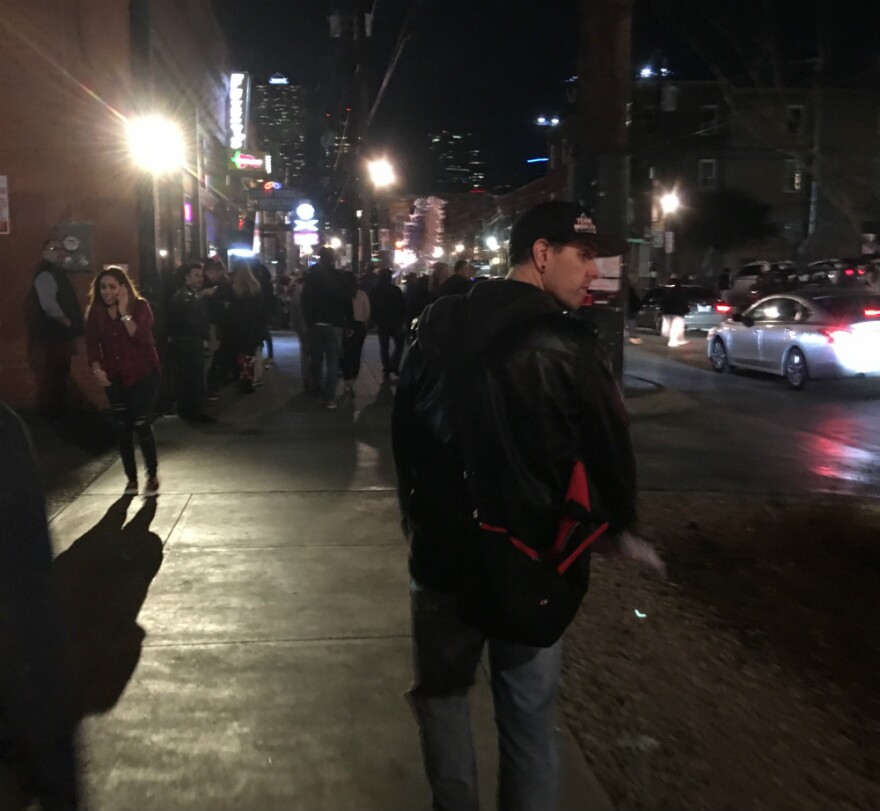For more than a dozen years, volunteers have walked through Dallas neighborhoods in midwinter to count people living on the streets.
This year, for the first time, some of the groups were specifically looking for anyone younger than 24. The thing is many of those people don’t actually consider themselves homeless.
Helping homeless youth
On a near-freezing Thursday night, six volunteers and youth advocates huddle in Deep Ellum. The neighborhood’s mixed — busy blocks jammed with bars and partiers, alternating with sparsely populated, dark streets with industrial buildings, apartments and the odd storefront.
The bundled-up team assembles near Malcolm X Boulevard and Taylor Street. Keri Stitt says they're out to survey homeless youth. Stitt is the director of non-residential services for Promise House, which has served youth in crisis since 1984.
“There are about 12 sites,” Stitt says. “People will be dispersing to basically canvas Dallas and find youth that are living on the streets, build a relationship with them, and eventually, the hope is that they’ll fill out one of our surveys to help us to identify what resources they need.”
Stitt says "youth" for this survey means those aged 12 to 24. Promise House tried this before but explains it didn’t quite work.
“We set up in one location and expected the youth to come to us,” she says.
This time, using models from Houston and Austin, volunteers are going to them. It’s not easy, team leader Josh Cogan says, because they hide in plain sight. Cogan’s the program director at Outlast Youth, which serves lesbian, gay, bisexual and transgender youth. He’s also the county outreach liaison for Promise House.
“They look like any other teenager hanging out,” Cogan says. “They don’t want to be found. They might not even resonate with the word 'homeless.' Maybe they have a couch to bounce around on, but they still don’t have a stable living environment.”
Kicked out at 14
Anita Crethers, 26, remembers that homeless life too well.
“When you go through situations like that, you try your best to hide and conceal it,” she says.

Crethers was 14 – in middle school — when she first lived on the streets in southern Dallas. That was a dozen years ago. Her mother had just died of a heart attack. She and her dad weren’t just grieving, but feuding. After she stayed out all night a few times, her father just kicked her out. She learned sofa-surfing had its limits.
“I got tired of asking people to stay at their homes where their parents might didn’t want me there,” Crethers says. “Some nights I would just sleep [in] abandoned homes, a park — somewhere I felt would be safe enough to sleep for a little while.”
Some nights a DART train was that all-night shelter. Others, a crack house — although she didn’t do drugs.
“It feels a lot safer inside of a drug house than it does inside of a dark park where there’s nobody there,” Crethers says, “and somebody walks up on you and you don’t know who they are.”
The whole time, Crethers says, you want to blend in, drawing no attention or pity, and just be normal.
You learn to be cautious, Cogan says. He says 40 percent of homeless kids are LGBT, and for that reason, have been thrown out of the house.
“If you’re kicked out by your family, the very people you’re supposed to trust,” he asks, “why would you trust anyone?”
Promise House CEO Ashley Lind understands.
“They’ve been hurt emotionally and physically in so many ways. We would like to support them and ask questions and don’t intend to hurt them in any way, and slowly bridge that barrier and ask their permission,” Lind says.
A worthwhile effort
On this night, across the street from the Sons of Hermann Hall, Cogan’s approach is slow and cautious. A white tent, hidden behind some trees and weeds, is somebody’s home. Maybe they’re young enough for this survey. Cogan shines a flashlight as a warning. He turns back to his team and tells them to “just kind of hang back.” He quietly takes a step or two closer to the tent. “No one poking out,” he concludes.

So the team moves on to bustling Main Street, packed with clubs and crowds. After more than three hours in Deep Ellum, Cogan calls it a night. They haven’t found a single person eligible for the survey.
But volunteers will be back out six different nights; they’ll have final tallies by April.
Crethers thinks it’s worth the effort. She says when she was homeless, Promise House helped her stay in school – even with two young kids.
“I actually made it my duty to continue to go to school while raising my children knowing that one day it would pay off.”
It has. Crethers graduated from college and now attends grad school while working at Dallas City Hall.
She says life can still be a struggle, though she’s driven, not just for her but her kids.





